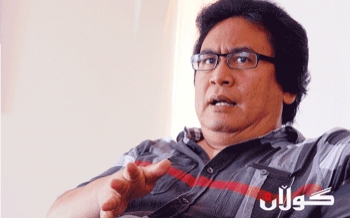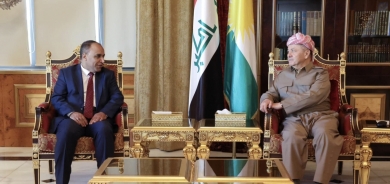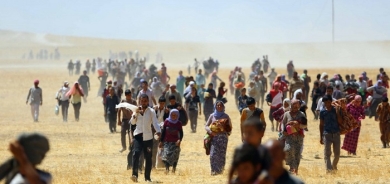Professor Vedi Hadiz: the reason that people who might be called Islamic populists initially embraced aspects of the democratic process was because other strategies seemed to have failed to e
October 17, 2015
Exclusive Interviews

1- If until the beginning of 21st century populism phenomenon was mostly related to either right or left populism, but after the Arab Spring revolutions another type of populism emerged, as a result they could gather oppressed people from small Bourgeoisies, educated middle class and village elites in order to win the elections, as we saw Muslim Brotherhood in Egypt, Hamas in Palestine and prosperous justice party in Indonesia, but as a result they ended democracy. According to your opinion; to what extent Islamic populism endangers future of democracy and freedom?
There is an interesting problem here. But let's get a definitional issue out of the way first: Islamic populists, for me, are those who try to forge a cross class alliance on the basis of an ummah identity. They imagine politics in terms of perpetually marginalised and moral ordinary people who are pitted against secular and corrupt elites. On the one hand, the reason that people who might be called Islamic populists initially embraced aspects of the democratic process was because other strategies seemed to have failed to enable their access to state power, including those involving violence. So the democratic embrace has been mostly seen where party politics and electoralism can provide an avenue to state power, which has usually meant toning down some of the hard-line Islamist language to reach audiences beyond the strictly Islamist one. They probably also realised that a formally Islamic state was not needed when control over the secular state can deliver the sort of authority and control over resources from which Islamists felt they had been excluded by secular authoritarian regimes. On the other hand, there always needs to be social forces that can compete with Islamic populism so that it then does not systematically use state power in ways that infringe on rights and freedoms, especially those of non-Muslims and other minorities. In other words, to be democratically-inclined, Islamic populist must see that they have a shot at state power through the democratic process but not be so dominant that they can run roughshod over everyone else. When they do not see this as a possibility, there is a great chance that some will pursue other strategies, including those that utilise violence. I think we are already seeing that in Egypt. Here, the Muslim Brotherhoood, whose FJP came to power through elections, mistakenly thought that it was so dominant (excepting the army, which it always feared) that it could colonise the entire state apparatus within a very short period. Morsi's subsequent ouster from power and the clampdown on the organisation has ensured that the democratic discourse is no longer pervasive among its constituency. Especially some of the MB’s young members, who never tasted the fruits of power directly anyway, will be inclined now towards strategies that reject the embrace of principles of freedom and democracy.
2- Another dangerous aspect of populism aim is to change the power of voting to motivate protests and criticizing, this method is pursued by Islamic Salafi Jihadism in the west for growing terrorism in the frame of western law. They prepare a provocative and protesting ground since the western laws cannot stop them. To what extent Salafi Islamic populism has been successful in exploiting the western environment for producing severity?
Significantly Salafi Jihadism is -- in principle -- against voting. However, we have seen – again in Egypt – that Salafi Jihadist have formed or joined political parties and engaged with the electoral process. It remains unclear in what way such participation has been ‘doctrinally’ absolved. But prior to this, we also saw that they were, among the Islamists, relatively OK under the Mubarak regime. This means that Salafi Jihadists have been quite flexible in their politics even if they are very rigid doctrinally. In the West, Salafists have taken advantage of the rise of the Far Right in various countries to legitimise their presence in Muslim communities. Far Right parties and movements tend to have anti-immigration and overtly racist attitudes, thereby further alienating already alienated members of Muslim communities in the West, especially their youth. Both the Far Right and the Salafists have made use, ironically, of Europe’s democratic environment to propagate undemocratic ideas and practices. They mutually feed on each other though – one’s hatred for the other makes each of them stronger.
3- Since populism strategy relies on gathering support of people by any reason, we feel it from Middle East sometimes a good coalition comes about between left populism and Islamic populism, they both work on insulting the institutions and violating rule of law. According to your opinion; is there any persuading explanation for the partnership of left and Islamic populists?
At the moment it is hard to imagine a proper partnership between the Left and Islamic Populists although it is not impossible. In the past, places as different as Indonesia and Iran have produced Muslim communists, for example. In these countries and in Turkey and elsewhere there remain pockets of Islamic Leftists though they tend to be a minority among the Left as well as among Islamists. On the one hand, the failures of political liberalism and social democracy in the context of widespread and systematic injustices and inequalities across the world might seem to provide a setting for the possible partnership of Leftist and Islamist critiques of many existing social orders in the Muslim world. On the other hand, this is constrained by recent and repetitive histories of conflict between the Left and Islamists, because the two were often pitted against each other by the power holders of secular nationalist states. In Indonesia, for example, Islamists were complicit in the army-led large-scale massacre of communists and their sympathisers in the 1960s. Today, the activists of many Islamic organisations feel threatened when this memory is invoked. All across the Middle East, in different variations and scales, the Left and Islam has been pitted against each other as well by militaries and dictators, from Tunisia to Egypt to Turkey to Iran.
4- According to the situation in the Arabic countries after the rise of Arab Spring, we see that well organized parties can gather huge number of supporters for the election, these populists promise incredible things to the poor and ignored people, but when the elections are over, these people will stay the same and will continue with their problems. According to your opinion; to what extent an overall chaotic situation might come about when the promises of these parties are not implemented after the elections?
In the end Islamic populists have to show that they are able to govern, including the economy. The AKP in Turkey has been resilient because it has the ability to claim competence in this field, taking power after the economic crisis of 2001, which could be blamed on the Kemalists. In Tunisia, however, En Nahda squandered a lot of the sympathy large sections of the public had for it by not demonstrating an ability to govern properly. The fact that people’s lives did not improve was blamed on them after the promises that were given. The same happened even more dramatically in Egypt. Here, the economic situation continued to deteriorate several years after Mubarak fell. Given that the Muslim Brotherhood was the main beneficiary of the demise of the Mubarak regime, people blamed the organisation for the country’s woes. We have seen what the result of this was.
5- The main problem of the new democracies is emerging of populist leaders, obviously this is seen in the Latin American and post communist countries, since the populist leaders are using the poverty and bad aspects of the society as a tool for their populism strategy, we see that usually there will be critics and protests but the ballot boxes will never resolve the problems. To what extent undermining ballot boxes undermines rule of law and democracy?
The main problem, as I see it, is that liberal democracy has lost much of its legitimacy. For example, the fact that American democracy produced George W. Bush and is presenting Donald Trump as a viable leader is no advertisement for it. Social democracy, moreover, began losing its energy a long time ago together with the dwindling influence of organised labour. The Left was vanquished in the Cold War and so is unable to respond to social circumstances to which it should have responses. So what remains for many people are the options of hypernationalism, xenophobia, religious fanaticism and racism. These can be attractive to many young people facing bleak futures, the urban marginalised, the precariously employed – all of whom have been betrayed by the promises of liberal modernity. Combine this with neoliberal ascendancy and you have quite a distressing world. The ballot box alone cannot change that.
6- Mostly emerging of populist leaders in the countries that are at war, it leads to missing peace opportunities, for example emerging of Hamas in Palestine, since the victory of Hamas in the elections there is no any remaining chance of peaceful agreement and the rate of violence is constantly increasing. To what extent populism endangers peace and security of the whole area it emerges from?
-Hamas came to power because of the failure of the PLO and general disenchantment with it among the Palestinian people. The failure of the PLO had many internal reasons, like corruption, but also a lot external ones, including the policies of the USA. Hamas benefitted from the vacuum created by the diminishing popular support for the PLO among the people it was supposed to represent. It has also benefitted from the rise of the Far Right in Israel, which is influencing policy in Israel in a way that is disproportionate to its actual strength. But like the Far Right in Europe, elements of its agenda have been mainstreamed as the more established conservative political parties adopt them. The belligerence and aggression of the Israeli Far Right provides legitimacy for Hamas while Hamas' apparent lack of interest in the peace process ensures a degree of respectability for Far Right positions in Israel. At the same time, Isreali military strikes that cause so much suffering among ordinary Palestinians provides legitimacy for Hamas. So again we see a process whereby those who foster animosity to legitimise their own existence are engaged in a mutually reinforcing relationship to the detriment of society at large.
7- Since the wide spread of social networks in the life of people, all Islamic parties including both moderate and extremists, they tend to exploit this development against democracy and freedom. To what extent Islamic populism has benefited from the development of technology?
The thing about technology is that anybody can use it but that doesn’t mean that technology creates an equal political playing field. In the long run, technology does not make social movements though social movements can take advantage of it. Social movements that are already well organised will be able to make better use of technologies like the Internet and social media. Otherwise, what you have would be individual activists who might never meet each other and produce anything larger because they just stay in their own living rooms. One has to remember though that states, including authoritarian ones, can make use too of such technologies to foster disinformation and manipulate public opinion. So there is nothing that is innately democratising about technology -- it depends much on who uses it and for what purpose. Islamic populist forces have been able to make use of technology -- as the reports on the initial Arab Spring uprisings make clear. However, use of a common technology did not prevent them from breaking with the various other political elements that had come together in Tahrir Square almost as soon as Mubarak had been ousted. Liberals, Nasserists, Leftists and Islamists no longer cooperated with each other once this was achieved, as they went back to their own little boxes, which was something that eventually benefited the military and the old forces. Of course there is irony in the fact that Salafists in particular, who are so enthralled by 7th century desert society life, feel at home using modern technological gadgets. But this doesn't become so surprising when one realises that many of them are IT engineers and the like. Indeed, it has been shown that some of the most rigid of the Islamists often come out of educational backgrounds in disciplines where truth is always as simple a matter as 1 + 1 = 2. So again there is nothing innately democratising about technology -- what matters is who uses it and for what kind of agenda.















